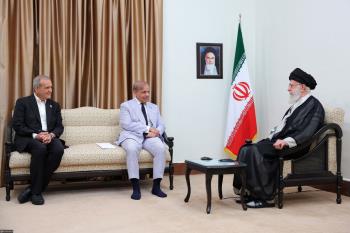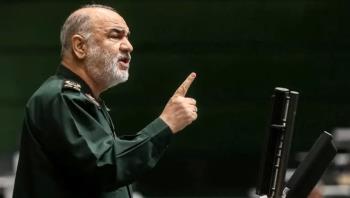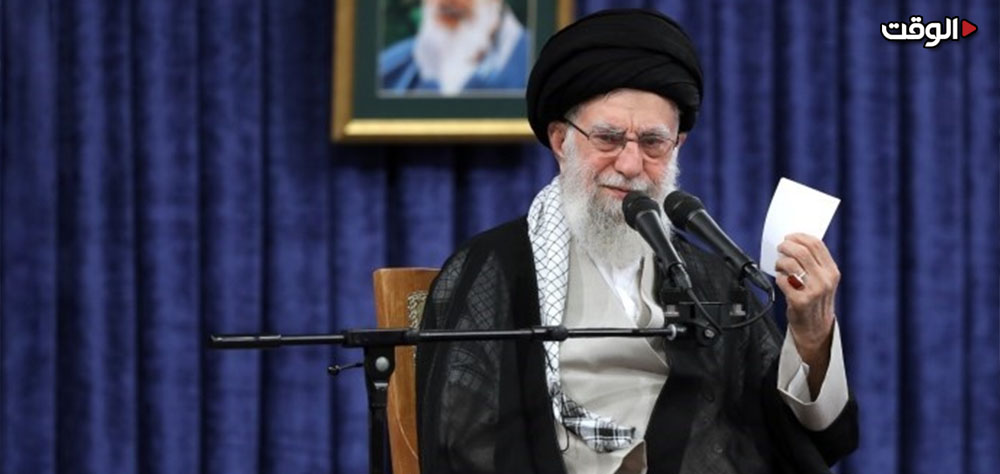Alwaght- After a relative calm in the atmosphere of four rounds of indirect nuclear negotiations between Iran and the US, with the White House's malicious and excessive remarks against the Iranian people's indisputable right to peaceful nuclear energy surfacing, the honorable, firm, and decisive positions of the Supreme Leader of the Iranian Islamic Revolution Sayyed Ali Khamenei in clarifying the Islamic Republic's red lines to American officials once again, as always, boosted Tehran's bargaining power on the negotiating table and shattered all the dreams of the enemies to dismantle Iran's nuclear and missile programs.
On the first anniversary of President Ibrahim Raisi, the Leader commented on the ongoing talks with the US, saying: "The American side that is participating in these indirect negotiations should try not to talk nonsense. It is a big mistake to say that we will not allow Iran to enrich uranium. No one is waiting for permission of this or that. The Islamic Republic has a policy and a method and is following it."
He added: "Indeed, in another event, I will explain to the people why they [ Americans] focus on enrichment, why Western and American parties and others insist so much that there should be no enrichment in Iran. God willing, I elaborate on these [issues] on another occasion for the Iranian people so that they know what the other party's intentions are."
The Leader referred to the successful experience of the government of Sayyed Ibrahim Raisi against the American excesses, holding: "By rejecting any direct negotiations with America, Martyr Raisi did not allow the enemy to say that I was able to bring Iran to the negotiating table by threats and enticements, by trickery. A major part of the fact that the [Western] parties insist on direct negotiations is that he did not allow it. Of course, indirect negotiations existed during his time, as they are now, of course without results, and now we do not think they will come to a conclusion and we do not know what will happen."
Response to the US nonsense
The remarks of the Leader came in response to the statements by the American officials who called for the dismantling of all Iranian nuclear facilities. The American officials in recent weeks have repeated their largely contradictory remarks, calling for direct talks while threatening Tehran with military action.
They have tried to present a positive outlook for their negotiations with Iran on the one hand, and on the other, by repeating claims and threats within the framework of the failed policy of maximum pressure and media propaganda, they raised fear about the consequences of not reaching an agreement.
Steve Witkoff, Trump’s special envoy for West Asia, who also heads the negotiating team with Tehran, claimed in his latest statements: “President Trump is looking for a diplomatic solution and has even sent a letter to the Iranian leader. But we have a red line: enrichment. We will not accept even one percent of it. Our offer to Iran is respectful and the goal is to reach an agreement without enrichment, because this path leads to the production of nuclear weapons, and we hope that the negotiations will yield positive results.”
The US Secretary of State Mark Rubio at a Congress hearing held that Iran does not need enrichment for nuclear power. He used the rhetoric the Americans had used for Libya that ended in dismantling the North African country's nuclear facilities.
Also, in a letter recently signed by all Republicans of the Senate and 177 of the House members, it is emphasized that Iran must completely abandon any capacity to enrich uranium, even for energy purposes.
Trump himself has repeatedly claimed that he does not accept the continuation of enrichment in Iran, and in his speeches in Qatar he also claimed that Iran has enough oil and does not need nuclear energy.
Such bullying statements and departure from the positive atmosphere at the negotiating table, which seems to be influenced by the increase in the Israeli lobbying, have placed the possibility of reaching an agreement in an state of ambiguity, and the delay in holding the fifth round of talks is also based on the fact that Tehran does not trust the Americans as in the past.
Iran is not Libya to surrender to the West
The US and Israel are pushing to sign a deal with Iran like what they imposed on Libya in 2003. But they are far from success when it comes to Iran.
In Libya model, under Western pressure, Tripoli completely dismantled its nuclear program and handed over its equipment to the West. However, despite the Gaddafi regime's trust in the promises of the West, this action not only did not lead to the lifting of sanctions and the end of hostilities, but also Libya was pushed into the abyss of civil war as the West designed and is now on the verge of partition.
Although the experience of the stab in the back of Libya is today considered a historical lesson of the West's treachery and betrayal, even if such an experience did not exist, Iran would not have allowed such a scenario since Tehran is different from Tripoli in many ways.
Iran is a republican country based on active public participation. This feature makes strategic decisions, including in the foreign policy and nuclear program, to rest on internal consensus and national support. Such a structure helps the Islamic Republic not to give in to foreign pressures or abruptly quit its principal positions.
Iran is also one of the most powerful political, military, and geopolitical players in West Asia. Its regional influence has made Tehran not only unintimidatable, but also recognized as a decisive power in the regional equations. For this reason, Iran is not in a weak position to give up its strategic achievements, like Libya, with a few Western promises.
Apart from these, Iran’s nuclear technology is indigenous and developed based on the capabilities of domestic scientists. This feature has made it not only very difficult to dismantle it, but also ensures the reversibility of this capability in the event of any agreement. This is one of the key differences with the Libyan model, because Libya’s nuclear program was in its early stages and was formed with foreign assistance.
Additionally, despite all the blackening media campaigns of the West, Iran's nuclear program poses no threats to the neighbors.
Tehran has repeatedly emphasized that its nuclear program is purely peaceful and within the framework of the NPT. Evidence and verification of this can be seen in the increasing efforts of Arab countries to mediate between Tehran and Washington. These actions show that even the countries of the region do not consider Iran to be a threat, but rather want to de-escalate tensions and maintain regional stability with Iran's active presence.
Furthermore, Russian and Chinese efforts to mediate between Iran and the US demonstrate that in the eyes of part of the world powers with the veto right in the UN Security Council, Iran is not a threat to the international community and these diplomatic actions are a confirmation of the peaceful nature of Iran's nuclear program and Tehran's stable place in the world equations.
So Libya experience repeat is not only unrealistic, but also is against the regional developments and Iranian home realities. Therefore, American push for full stop to Iran's enrichment using pressure and threats goes nowhere.
The failure story of Libya nuclear agreement showed that surrender to the Western demands not only brings no security, but also makes ground for collapse. So, Iran will not forsake its legal right to peaceful nuclear energy under any conditions and the feasible choice of agreement is honorable negotiations and mutual respect.



























